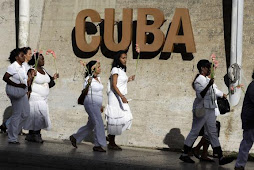Cuba opens pipeline of baseball talent to Japan, U.S. left out
By Daniel Trotta and Junko Fujita
Reuters
11:53 p.m. CDT, July 3, 2014
HAVANA/TOKYO (Reuters) - Cuba is allowing some of its best baseball
players to take their skills to Japan and make good money instead of
risking their lives at sea with human traffickers in pursuit of Major
League Baseball dreams.
The bright lights of the U.S. big leagues do still draw Cuban prospects
to speedboats in order to escape the communist-run island - one player
just left the island and six others were excluded from the national team
for trying.
But now they have options.
In an attempt to halt defections, Cuba is allowing some of its players
to sign overseas contracts while raising the pay of those who stay.
Two of Cuba's biggest stars have signed officially sanctioned contracts
this season with Nippon Professional Baseball teams, and Cuba for the
first time is welcoming foreign scouts. South Koreans have also come
looking for Cuban talent.
Cuban baseball officials have indicated more signings are likely, though
they have not said how many.
"We would like to hire more Cuban players in the future," said Masao
Shimazaki, director for international relations for the Yomiuri Giants.
"One reason Cuba has a lot of good players is because Cuba does not have
an agreement with MLB yet."
Cuba once prevented its stars from playing in the United States but now
Major League Baseball teams are shut out of the Cuban market only
because of the decades-old U.S. economic embargo of the country.
Without the embargo, they would be free to scout and sign players
straight out of Cuba as long as they are willing to share the rights to
players with the Cuban government, which also takes a 20 percent cut of
the contracts plus income tax.
The shakeup in Cuba's rules comes at a time of unprecedented success for
Cuban players, as typified by this year's sensation, Jose Abreu of the
Chicago White Sox.
After defecting last year, Abreu signed a six-year, $68 million contract
and deftly adapted to the big leagues. He is among the league leaders in
home runs.
Since 2009, more than 20 defectors have signed MLB contracts worth a
combined total of more than $330 million, according to data on
Baseball-Reference.com.
Players in the Cuban league were lucky to make $20 a month until
recently. Now the minimum salary is over $40 a month, and veteran
players can earn several times that.
DANGER AT SEA
Yasiel Puig defected from Cuba on a speedboat at age 21 and soon found
himself entangled with Mexico's notorious Zetas crime organization,
which threatened to chop off his arm if it failed to receive the
promised $250,000 fee for his passage.
When Puig finally reached U.S. shores in 2012, he was rewarded with a
seven-year, $42 million contract with the Los Angeles Dodgers.
By contrast, Frederich Cepeda is one of Cuba's most accomplished players
over the past decade. When the Cuban government finally gave Cepeda his
chance to find fortune overseas, he was past his prime at age 34 so he
signed a one-year, $1.5 million deal with Japan's Yomiuri Giants.
Cepeda was the first to arrive in Japan in April, followed by Yulieski
Gourriel, who signed a $900,000 deal with the Yokohama DeNA Baystars in
May. Both are veterans who had proven their loyalty to Cuba before being
rewarded with the chance to play in Japan.
Cepeda said he long wanted to test himself against better competition
but chose to wait for a legal option rather than leave behind his wife
and 6-year-old son.
Source: Cuba opens pipeline of baseball talent to Japan, U.S. left out -
chicagotribune.com -
http://www.chicagotribune.com/news/sns-rt-us-cuba-baseball-20140703,0,6345457.story
Subscribe to:
Post Comments (Atom)





No comments:
Post a Comment